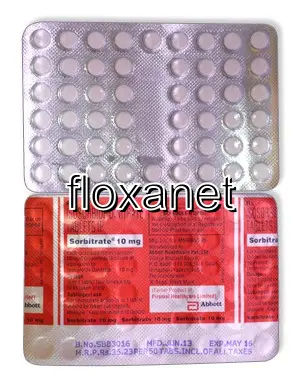Buy Isosorbide Dinitrate Online in Australia
| Package | Dosage | Price | Price per Dose | |
|---|---|---|---|---|
| Dosage: 10mg | ||||
| 360 pill | 10mg | AUD567.88 | AUD1.58 | |
| 180 pill | 10mg | AUD309.56 | AUD1.72 | |
| 120 pill | 10mg | AUD226.75 | AUD1.89 | |
| 90 pill | 10mg | AUD183.36 | AUD2.03 | |
| 60 pill | 10mg | AUD134.07 | AUD2.23 | |
| 30 pill | 10mg | AUD74.91 | AUD2.46 | |

Isosorbide Dinitrate Description
Overview of Isosorbide Dinitrate
Isosorbide Dinitrate is a medication commonly used to prevent and relieve chest pain (angina) caused by coronary artery disease. It belongs to a class of drugs called nitrates, which work by relaxing blood vessels and improving blood flow to the heart. By dilating the veins and arteries, Isosorbide Dinitrate reduces the heart's workload and oxygen demand, helping to alleviate angina symptoms and prevent attacks. It is available in various forms, including tablets and extended-release formulations, allowing for flexible dosing schedules tailored to individual needs.
Mechanism of Action
The primary action of Isosorbide Dinitrate involves converting into nitric oxide inside the body. Nitric oxide acts as a vasodilator, signaling the smooth muscles in the blood vessel walls to relax. This relaxation widens the vessels, decreases vascular resistance, and lowers blood pressure. As a result, the heart receives more oxygen-rich blood, and the effort needed to pump blood decreases. This mechanism makes Isosorbide Dinitrate effective in managing angina and reducing the risk of cardiac complications caused by insufficient blood flow.
Uses and Benefits
Isosorbide Dinitrate is mainly prescribed for the long-term management of angina pectoris. It helps to reduce the frequency and severity of anginal episodes, thus improving patients’ quality of life. Additionally, it is sometimes used in the prevention of angina during physical exertion or stress. Patients with chronic angina find this medication beneficial because it provides a steady baseline level of vasodilation, helping to prevent sudden attacks. Proper use of Isosorbide Dinitrate can also lessen the need for emergency treatments and hospital visits related to anginal crises.
Potential Side Effects
Like any medication, Isosorbide Dinitrate may cause side effects in some individuals. Common adverse reactions include headaches, dizziness, flushing, and lightheadedness. These effects are often related to the vasodilatory properties of the drug and tend to diminish over time. Less frequently, some people might experience nausea, hypotension, or allergic reactions characterized by rash or swelling. It is important for patients to report any unusual symptoms to their healthcare provider promptly.
Precautions and Interactions
Before starting Isosorbide Dinitrate, patients should inform their doctors about existing medical conditions, especially hypotension, severe anemia, or increased intracranial pressure. The medication can interact with other drugs, such as phosphodiesterase inhibitors used for erectile dysfunction, which can lead to dangerous drops in blood pressure. Combining Isosorbide Dinitrate with alcohol may also enhance side effects like dizziness and hypotension. Patients are advised to avoid suddenly stopping the medication without medical advice to prevent angina rebound or other complications.
Usage and Dosage
The dosage of Isosorbide Dinitrate depends on the individual's condition and response to treatment. It is typically prescribed at a low dose initially to minimize side effects, with gradual adjustments made by the healthcare provider. Tablets should be taken as directed, usually multiple times a day, with or without food. Extended-release formulations allow for once-daily dosing, offering convenience for patients. It is crucial to adhere closely to the prescribed schedule and not to alter doses without medical consultation.